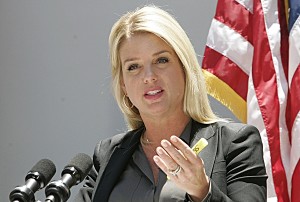Florida officials mum on EPA rule, natural gas wins big

By William Patrick | Florida Watchdog
TALLAHASSEE, Fla. — Thanks to natural gas, two of Florida’s largest energy providers appear to be one step ahead of the U.S. Environmental Protection Agency’s latest assault on coal-fired power plants.
BONDI: It’s unclear whether she will fight EPA’s new coal-fired power plant emission reductions.
What remains unclear is whether state officials will fight the regulation requiring a 38 percent cut in Florida’s carbon emissions by 2030.
A spokesman for the Florida attorney general’s office confirmed to Watchdog.org the state is already involved in litigation over a previous EPA air pollution rule. The spokesman wouldn’t say whether Attorney General Pam Bondi will take on the new federal edict.
In 2011, Florida joined six states to challenge an EPA rule aimed at curbing the “interstate transport of fine particular matter.” Bondi called it “costly” and “based on a flawed process.”
Bondi also cited a disproportionately required reduction in Florida’s emissions compared to other states. The same appears to be true with the new EPA proposal. Nationwide, the Clean Power Plan requires a 30 percent total reduction in carbon emissions.
A spokesperson for the Florida Department of Environmental Protection said the department is reviewing the EPA plan, and John Tupps, a press officer for Gov. Rick Scott, told Watchdog.org in an email that “Florida air emissions are the lowest on record.”
In light of the EPA, and to the dismay of anti-fracking groups, Florida’s energy future appears more dependent on natural gas than ever.
Florida derives 68 percent of its energy from natural gas, and a reduction in coal-powered energy is increasing demand for the cleaner-burning fossil fuel.
Duke Energy Florida has two coal-fired units at its Crystal River Energy Complex. It plans to close them due to federal environmental regulations, according to a company statement.
“Our proposal is the most cost-effective option for customers that provides systemwide reliability,” said Alex Glenn, president of Duke Energy Florida.
By 2018, Duke’s 1.7 million Florida customers will reportedly begin receiving electricity from a 1,640 megawatt, $1.5 billion natural gas plant. The gas will be delivered through a pipeline starting in Alabama and ending in central Florida.
NextEra Energy, headquartered in Juno Beach, is the parent company of Florida Power and Light. FPL serves 4.7 million customer accounts.
A statement by CEO Jim Robo following the EPA’s announcement Monday said the company has been “investing billions of dollars to modernize (its) system,” and U.S.-produced natural gas is a major component.
Some environmentalist groups aren’t so keen. The Sunshine State Clean Energy Coalition touts natural gas as “a bridge to nowhere,” citing a Cornell University study on its website.
According to the Florida Natural Gas Association, Florida ranks third nationally for total energy consumption. More than 894 billion cubic feet of natural gas is consumed annually, with 85 percent attributed to power plants.
Watchdog.org contacted FNGA for comment but didn’t receive a response.
Contact William Patrick at wpatrick@watchdog.org







